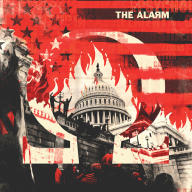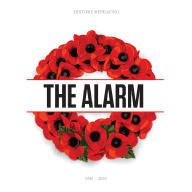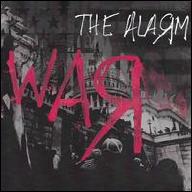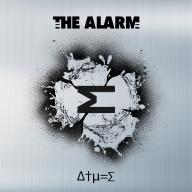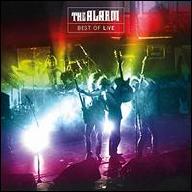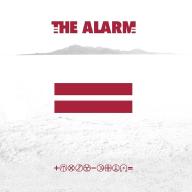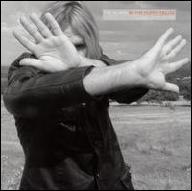The Alarm was formed in Rhyl, Wales in 1981 by vocalist/guitarist Mike Peters, who'd started out in a local punk band called the Toilets along with Alarm drummer Nigel Twist. When that band broke up, Peters -- then playing bass -- formed a new outfit called Seventeen (after the Sex Pistols song) with guitarists Eddie MacDonald and Dave Sharp, both local scenesters and longtime friends. Seventeen was initially influenced by the Pistols, the Clash, the mod-revival punk of the Jam, and the punk-pop of ex-Pistol Glen Matlock's Rich Kids. Their songwriting interests grew more socially conscious, and in early 1981, the group reinvented itself as the Alarm, taking the name from a Seventeen song called "Alarm Alarm." Later that year, they moved to London and self-released their debut single, a Peters/MacDonald-penned political rocker called "Unsafe Building," backed with Sharp's folk-punk tune "Up for Murder." By this time, MacDonald and Peters had switched instruments, with Peters taking up rhythm guitar and MacDonald moving to bass.
In 1982, the Alarm signed with IRS and issued another single, "Marching On." On the strength of their live shows, U2 tapped them to open their 1983 supporting tour for War, which helped make the group's next single, the Stephen King retelling "The Stand," into an underground hit. The Alarm's self-titled debut EP appeared later in 1983, compiling previous single releases, and setting the stage for the release of their first proper album, Declaration, in 1984. A Top Ten U.K. hit, Declaration spun off several popular singles, including the Seventeen holdover "Sixty-Eight Guns" (which made the pop Top 20), "Where Were You Hiding When the Storm Broke?" (which just missed), "The Deceiver," and the live staple "Blaze of Glory." Non-LP singles followed in a cover of "The Bells of Rhymney," the new wave dance tune "The Chant (Has Just Begun)," and the British Top 40 hit "Absolute Reality."
The Alarm's sophomore effort, 1985's Strength, was another U.K. success, and brought them into the Top 40 of the U.S. album charts for the first time; additionally, the single "Spirit of '76" was a Top 40 U.K. hit. Strength displayed greater subtlety and maturity in both their songwriting and arrangements and was often hailed as the group's best overall album. The Alarm took a break after the supporting tour, and returned in 1987 with Eye of the Hurricane, which featured more polished, mainstream production reminiscent of U2. The gambit helped them gain some rock radio play in America with the singles "Presence of Love," "Rescue Me," and especially the more danceable "Rain in the Summertime," and they landed a tour slot supporting Bob Dylan. A concert EP, Electric Folklore: Live, followed in 1988.
1989's Change was an homage to the group's native Wales and was accompanied by an alternate Welsh-language version, Newid. Produced by Tony Visconti, Change spawned the group's biggest modern rock radio hit in America, the bluesy "Sold Me Down the River," which also put them in the U.S. pop Top 50 for the first and only time. "Devolution Working Man Blues" and "Love Don't Come Easy" also earned radio airplay, and the track "A New South Wales" boasted an appearance by the Welsh Symphony Orchestra. Although it was hugely popular in Wales, it didn't sell as well as the group's earlier works, and internal band dissension -- exacerbated by deaths in both Peters and Twist's families -- made 1991's Raw the original Alarm's final effort. "The Road" was their final radio hit, but at a June 1991 show at London's Brixton Academy, Mike Peters announced he was quitting the Alarm, to the surprise of his bandmates as well as the audience, and that ended the group's first run.
Mike Peters and Dave Sharp both embarked on solo careers. Sharp issued albums in 1991 and, after relocating to New Orleans, in 1996. Peters, meanwhile, launched his 21st Century Recording Company, an independent label to give him greater control over his music, with 1995's Breathe: The Acoustic Sessions. He was subsequently diagnosed with chronic lymphocytic leukemia. He successfully sought treatment for the disease, and became a tireless fund-raiser for cancer-related charities. Peters completed two more solo records before forming Colorsound with former Cult guitarist Billy Duffy. Peters subsequently reunited the original Alarm lineup for several live appearances, and then formed a new unit consisting of guitarist James Stevenson (Gene Loves Jezebel, Chelsea), bassist Craig Adams (the Cult, the Mission UK, Sisters of Mercy), and drummer Steve Grantley (Stiff Little Fingers). In February 2004, this lineup of the Alarm pulled off a masterful hoax on the British music industry by issuing a garagey punk-pop single, "45 RPM," under the fictitious name the Poppy Fields. Peters had gotten positive feedback on the song but was told the Alarm's age and image would work against the song on the charts. He responded by recruiting a young Welsh group called the Wayriders to lip-sync the song in a music video. The so-called Poppy Fields took "45 RPM" into the U.K. Top 30 before the hoax was revealed, setting the stage for the new Alarm's first album together, In the Poppy Fields. The prank inspired a film, 2012's Vinyl, starring Phil Daniels and Keith Allen; Peters and the Alarm wrote new songs for the soundtrack album, and Peters appeared in the movie.
In 2006, another iteration of the Alarm released the LP Under Attack, which featured the hit single "Superchannel." They returned in 2008 with Guerilla Tactics, and the same year, Sharp formed another version of the band, AOR – The Spirit of the Alarm, with the goal of re-creating the sound of their '80s concerts. The band put out a set of new songs, Direct Action, in 2010, and 2011's The Sound and the Fury was a collection of re-recorded tracks from the band's and Mike Peters' catalogs. In 2014, Peters began to record reimagined versions of the Alarm's albums as a means of updating them for the 21st century. He began with Declaration, and followed that with Peace Train, which was devoted to re-recorded B-sides. By 2017 he had also re-recorded both Strength and Majority, and that same year he released the two-album project Blood Red and Viral Black. The full-length Sigma arrived in June 2019 and featured contributions from original guitarist Dave Sharp, as well as the Cult's Billy Duffy. 2021's WA? was an unusual project. It was written, recorded, and released in the span of 50 days; it first appeared in a special edition in which fans were sent the cover and a blank CD, with the music subsequently sent to buyers in the form of a download, allowing them to sequence the album as they pleased. An expanded alternate version of the album appeared in 2022 under the title Omega. ~ Steve Huey & Mark Deming, Rovi


